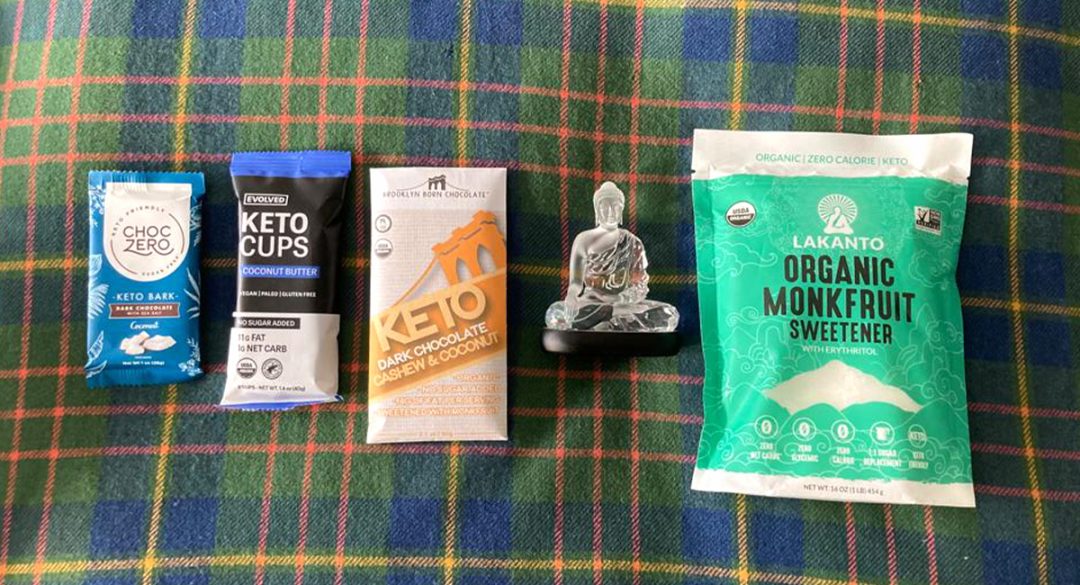On my recent trip to California I visited some of the fantastic organic supermarkets they have there. I was looking for some tasty treats that were sweetened with sugar alternatives. As well as the usual stevia, erythritol etc, I noticed that many things were sweetened with monk fruit.
I had only heard of monk fruit as a vegan alternative to meat, but never as a sweetener.
Turns out that monk fruit is a fantastic alternative to sugar
Originating from the south east of China, monk fruit belongs to the cucurbit family along with cucumber, watermelon and squash. It actually got it’s name from the Buddhist monks who were among the first to cultivate and use it. It’s very seldom eaten as a fresh fruit because it’s flesh degrades quickly and is usually dried or processed to make it to market. But here’s the great thing about it.
Monk fruit contains almost no carbs, sugars or calories
It’s therefore perfect for anyone following a keto or low-carb diet. It’s sweetness is derived from a group of antioxidants called mogrosides and is 250 times sweeter than regular sugar, meaning you only need to use very little of it.
However, there is a fair bit of processing required to achieve the “no calorie” version of the sweetener and the natural goodness of the fruit is mostly lost. There are more natural and less processed versions of monk fruit sweeteners but they contain a small amount of glucose and fructose. Meaning it’s still very low in sugar but not quite sugar free.
I asked a nutritionist what she thought of it. Her opinion was that it was great.
Monk fruit is arguably the best sugar alternative there is
I luckily brought back some chocolates and goodies sweetened with monk fruit and also a bag of it as a sweetener to bake with. I was curious as to why I had never seen it in the UK however and did some research. To my astonishment, it turns out that it may, in fact, be banned in the UK! Or maybe not, because there’s no government source explicitly saying that it is. How curious?
Why is monk fruit banned in the UK?
What reason could there possibly be? The use of monk fruit as a sweetener, it turns out, is relatively new. It was only commercially developed for the first time in the 1990’s. And only approved by the US Food and Drug Administration (FDA) in 2010. In 2017 an application was made to the European Foods Standard Agency (EFSA) for authorisation to use it as an additive for food. They set about determining whether it was safe and came to a result that didn’t prove it to be either safe or unsafe. They concluded that more research was necessary.
Is this something to be concerned about?
The fact is that this is really just a lack of conclusive evidence rather than a finding of any dangers or toxicity. Monk fruit is already allowed in more than 60 countries (all of which undertook extensive evaluations) including the US, Australia, Japan and Canada. Studies thus far have found no adverse effects in humans in moderate quantities (up to 60mg per 1kg of body weight).
However if you have an allergy to the squash and melon family of foods, then you may have an allergy to monk fruit.
I’ve already consumed a fair bit of it and am loving it. But can you even find it in the UK? In light of the fact that it hasn’t actually been approved here yet, it’s not going to be easy. However a quick google brought up this company (link at end of article) who seem to have a version of it.
It’s Chinese name is Luo Han Guo
You, therefore, might find it under that name. Also, I suspect, versions of it here may well be mixed with erythritol and/or stevia. Erythritol is often added to stevia to make it granulated. It turns out the granulated monk fruit I brought back from LA is also mixed with erythritol. Excess amounts may cause gas and possibly cause an upset stomach, But the whole point is that one shouldn’t be eating this in excess. The way I use it is to just give me a little something sweet when I have a craving for sugar. I only eat a small amount at a time.
Obviously, if you decide to try it, it must be at your own risk, as it’s not approved in the UK. If you have an allergy to the vegetables mentioned above, I would definitely avoid it.

Comments 2
Pingback: The low down on natural sweeteners – Ageless By Glynis Barber
I bring a stack of it back every time I go to the States, including sachets to keep in my bag when I stop for a coffee somewhere. Lakanto is by far the best sweetener available (or not, in the UK.) I find it ridiculous that it hasn’t been approved yet and wonder if the sugar industry might be behind that. I also think that erythritol is under utilized in the UK. I bet Coke Zero wouldn’t taste so bad if they used it.